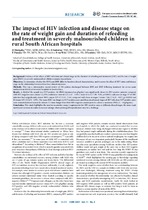| dc.contributor.author | Muzigaba, M. | |
| dc.contributor.author | Sartorius, B. | |
| dc.contributor.author | Puoane, Thandi | |
| dc.contributor.author | van Wyk, B. | |
| dc.contributor.author | Sanders, David | |
| dc.date.accessioned | 2017-07-14T07:05:38Z | |
| dc.date.available | 2017-07-14T07:05:38Z | |
| dc.date.issued | 2017 | |
| dc.identifier.citation | Muzigaba, M. et al. (2017). The impact of HIV infection and disease stage on the rate of weight gain and duration of refeeding and treatment in severely malnourished children in rural South African hospitals. South African Journal of Child Health, 11(2): 86-92. | en_US |
| dc.identifier.issn | 1994-3032 | |
| dc.identifier.uri | http://hdl.handle.net/10566/3077 | |
| dc.identifier.uri | http://dx.doi.org/10.7196/SAJCH.2017.v11i2.1194 | |
| dc.description.abstract | BACKGROUND: Evidence of the effects of HIV infection and clinical stage on the duration of refeeding and treatment (DRT) and the rate of weight
gain (RWG) in severely malnourished children remains inconclusive.
OBJECTIVES: To determine whether the RWG and DRT differ by baseline clinical characteristics, and to assess the effect of HIV status and disease
stage on the relationship between these two clinical outcomes.
METHODS: This was a retrospective record review of 346 patiens discharged between 2009 and 2013 following treatment for severe acute
malnutrition (SAM) at two rural hospitals in South Africa.
RESULTS: A third of the sample was HIV-positive, the RWG (measured as g/kg/day) was significantly slower in HIV-positive patients compared
with HIV-negative cases (mean 5.2, 95% confidence interval (CI) 4.47 - 5.93 v. mean 8.51; CI 7.98 - 9.05; p<0.0001) and cases at stage IV of HIV
infection had a significantly slower RWG (mean 3.97; CI 2.33 - 5.61) compared with those at stages I (mean 7.64; CI 6.21 - 9.07) (p<0.0001) and
II (mean 5.87; CI 4.74 - 6.99). The mean DRT was longer in HIV-positive cases and those at advanced stages of HIV infection. HIV-positive cases
were renourished and treated for almost 3.5 times longer than their HIV-negative counterparts to achieve a moderate RWG (5 - 10 g/kg/day).
CONCLUSION: This study highlights the need to reconsider energy requirements for HIV-positive cases at different clinical stages, for more rapid
nutritional recovery in under-resourced settings where prolonged hospitalisation may be a challenge. | en_US |
| dc.language.iso | en | en_US |
| dc.publisher | Health and Medical Publishing Group | en_US |
| dc.rights | The South African Journal of Child Health is an Open Access Journal and provides immediate open access to its content on the principle that making research freely available to the public supports a greater global exchange of knowledge. | |
| dc.subject | Sub-Saharan Africa | en_US |
| dc.subject | Malnutrition | en_US |
| dc.subject | HIV | en_US |
| dc.subject | Disease | en_US |
| dc.subject | Children | en_US |
| dc.subject | Rural hospitals | en_US |
| dc.title | The impact of HIV infection and disease stage on the rate of weight gain and duration of refeeding and treatment in severely malnourished children in rural South African hospitals | en_US |
| dc.type | Article | en_US |
| dc.privacy.showsubmitter | FALSE | |
| dc.status.ispeerreviewed | TRUE | |
| dc.description.accreditation | DHET | |

